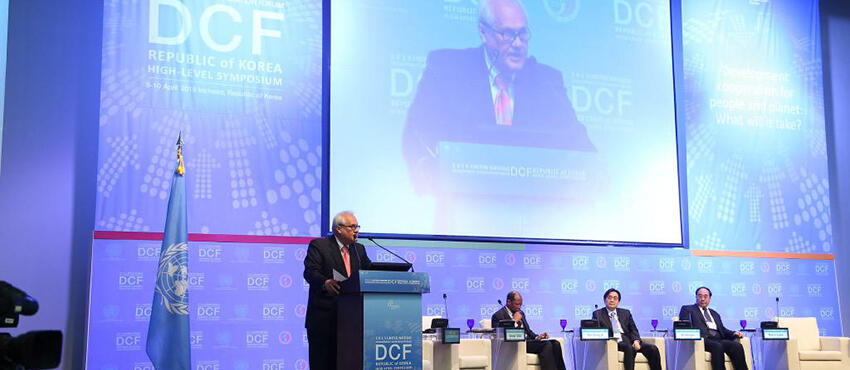
What will it take to put international development cooperation truly in the service of people and planet?
The Symposium in Incheon examined the role of development cooperation in implementing the post-2015 development agenda, at all levels, global, regional, national, and subnational. It engaged almost 200 high-level experts from a wide range of stakeholders.
Organized by UNDESA and the Republic of Korea, the Symposium served as the first high-level preparatory event for the 2016 Development Cooperation Forum. It aimed specifically to contribute to the preparations for the 2030 Agenda for Sustainable Development, including in the run-up to the Third International Conference on Financing for Development in Addis Ababa on 13-16 July 2015.
The Symposium focused on ways to align approaches to financing and other means of implementation coming out of the Monterrey and Rio processes. This is essential to allow countries and other stakeholders to meet three practical and critically important objectives: to take an integrated approach to development cooperation, to ensure more robust monitoring, review and accountability for progress, and to achieve better and more lasting development results.
The Symposium generated and reinforced the following key messages and policy recommendations:
- Implementing the post-2015 agenda will require a change in mind-set, country ownership at all levels and strong political will and leadership. Enhanced communication will be crucial.
- A universal agenda means joint responsibility of all actors, contributing their fair share while taking into consideration the notion of common but differentiated responsibilities.
- As the agenda has broadened, a major acceleration in the mobilization of financial and non-financial means of implementation from all sources, public and private and domestic and international is needed.
- Developed countries will have to honour past commitments, including the UN ODA targets of 0.7 % of GNI as ODA and the 0.15-0.20% of GNI as ODA to LDCs that should be met without delay.
- Under a revitalized global partnership for sustainable development, coherence at all levels and between different actors is fundamental for realizing the agenda. Development cooperation can serve in this context as an integrating force for sustainable development in this context.
- Targeted modalities of development cooperation, financial and non-financial, should be used in interconnected ways and chosen on a case-by-case basis, leveraging comparative advantages across different modalities, while responding to the country specific context.
- ODA will have to focus on where it is most needed, in the poorest, most environmentally and politically vulnerable countries, with poverty eradication as a key, explicit objective. With its ability to leverage other resources, ODA should be increasingly directed towards strengthening domestic resource mobilization and catalysing private sector financing for sustainable development.
- Delivery on the ambitious set of inter-linked SDGs and other commitments envisaged depends on the effectiveness of mutual learning and knowledge sharing. It will also require integration of monitoring, review and accountability for development results at all levels.
For more information, please see the Summaries as well as the 8th DCF Information Bulletin on DCF Republic of Korea High-level Symposium
Debriefing from DCF Symposium in New York
DCF Symposium
- Media coverage
- One-pager
- Programme [EN; ES; FR]
- Statements and Presentations
- List of participants
- Schedule of events
- Summary
Background studies and policy briefs
- DCF study on “Preparing for a post-2015 development agenda - the need for a coherent approach to commitments on financing and other means of implementation coming out of Rio and Monterrey tracks" [Executive Summary]
- What is development cooperation? [EN; ES; FR]
- Improving ODA allocation for a post-2015 world [Executive Summary and Policy Brief EN; ES; FR] [full-length scoping study]
- Monitoring and review of development cooperation to support implementation of a post-2015 development agenda [EN; ES; FR] [full-length scoping study]
- Addressing changes and challenges in monitoring and review of development cooperation at the national level [EN; ES; FR]
- Strengthening technology facilitation and capacity building in a post-2015 setting: Understanding the issues [EN; ES; FR]
- Assessing the suitability of different development cooperation modalities for greater effectiveness and impact post-2015 [EN; ES; FR]
Issue brief
Pre-meeting workshops
Financing for Development workshop on catalytic aid
Mutual Accountability workshop
Joint Meeting of General Assembly and ECOSOC: Curtain Raiser event for the Symposium
The Second Committee of the General Assembly and ECOSOC convened an interactive joint event on a renewed global partnership for development and successor arrangements to MDG8 on 30 October 2014, co-organized by the Republic of Korea and UNDESA.The lively event served to publicly launch and shape preparations for the DCF Republic of Korea Symposium. It provided a timely occasion to hear the views of experts and have an open dialogue in order to refine thinking and reach greater clarity on some of the questions at the heart of the post-2015 discussions and how to begin preparing for implementation at all levels. It also gave opportunity to identify questions that would benefit from in-depth collective and multi-stakeholder reflection at the Symposium.
 Welcome to the United Nations
Welcome to the United Nations 